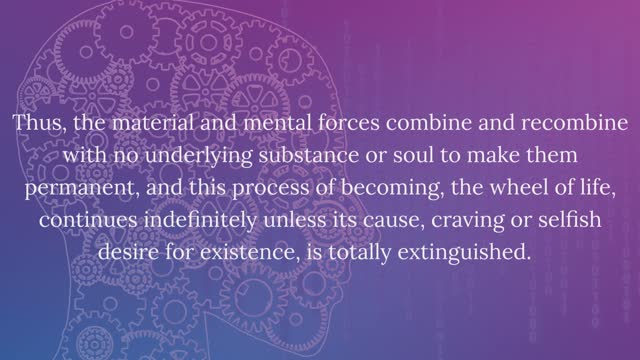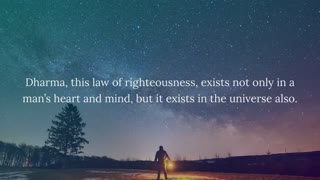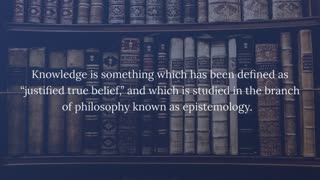Premium Only Content

Buddhism: How Karma Is Created
Karma (Sanskrit) and Kamma (Pali) is the principle that all good and bad actions have consequences that will affect one throughout life, and even in future lives.
By extension, karma is sometimes loosely used to mean fate or destiny.
Man is the architect of his own fate, and he will reap what he sows.
Thus, the material and mental forces combine and recombine with no underlying substance or soul to make them permanent, and this process of becoming, the wheel of life, continues indefinitely unless its cause, craving or selfish desire for existence, is totally extinguished.
It is this desire, which sets the wheel of life in motion, and it is manifested in action, which is in reality volition or will power.
Volitional action is responsible for the creation of being.
Every action produces an effect; cause comes first and effect afterwards.
We therefore may say that karma is the “law of cause and effect,” and that man because of his actions is the master of his own destiny, child of his past and parent of his future.
The law of karma explains why each individual has a unique mental disposition, a unique physical appearance and unique response to experiences.
These are the various effects of the countless actions that each individual performed in the past and are stored as mental habits.
At the root of man’s trouble is his primal state of ignorance, and from ignorance arises desire, which sets the karmic force in motion.
According to the law of karma, the tragedy of inequality in creation itself, falls short of any reasonableness.
For instance, the sadness of the spastic child and the sadness of the deaf and dumb, cannot easily be accommodated in the concept of the Compassionate Creator.
The Law of Cause and Effect is a logical and a reasonable explanation of the tragedy that is creation itself.
The universal law of karma throws a challenge and helps one to become the means to control one’s own fate. Intentional actions create karma.
The law of karma does not exclude people because of their intellect or other characteristics.
Buddhism teaches that consciousness is not a property of matter and life, is not a mere result of change produced by chemical or electric forces, but is a result of the Law of Causation.
One is responsible for one's own karma. We have to face the consequences of what we have done.
Buddhists believe in a just rationale of karma that operates automatically and speaks in terms of cause and effect instead of rewards and punishments.
Source: Food for the Thinking Mind by K Sri Dhammananda
Music: www.bensound.com
-
 2:42
2:42
Buddhist Mind
4 years agoBuddhism is the byproduct of Dharma
2331 -
 0:23
0:23
EntertainmentVideos
4 years agoBuddhism
14 -
 0:07
0:07
Davidtheexplorer
4 years agoVideo I created
1891 -
 13:02
13:02
Life'Views
4 years ago $0.01 earnedWho created Anarcho-capitalism?
3273 -
 0:31
0:31
Buddhist Mind
4 years ago $0.02 earnedBuddhism: 3 Characteristics in Everything
138 -
 2:46
2:46
Buddhist Mind
4 years agoAttaining Buddhahood | Buddhism
62 -
 2:18
2:18
Buddhist Mind
4 years agoBuddhism: Duty of Religion
120 -
 1:06
1:06
Bare End
4 years ago $0.03 earnedImpatient Driver meets Karma
208 -
 2:05
2:05
Buddhist Mind
4 years agoBuddhism: Knowledge vs. Wisdom
61 -
 0:31
0:31
Rakeen
4 years agoKarma (I’m Good)
70